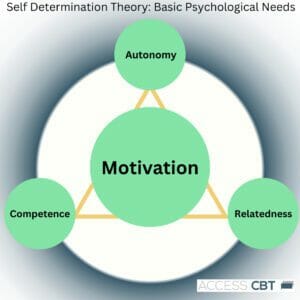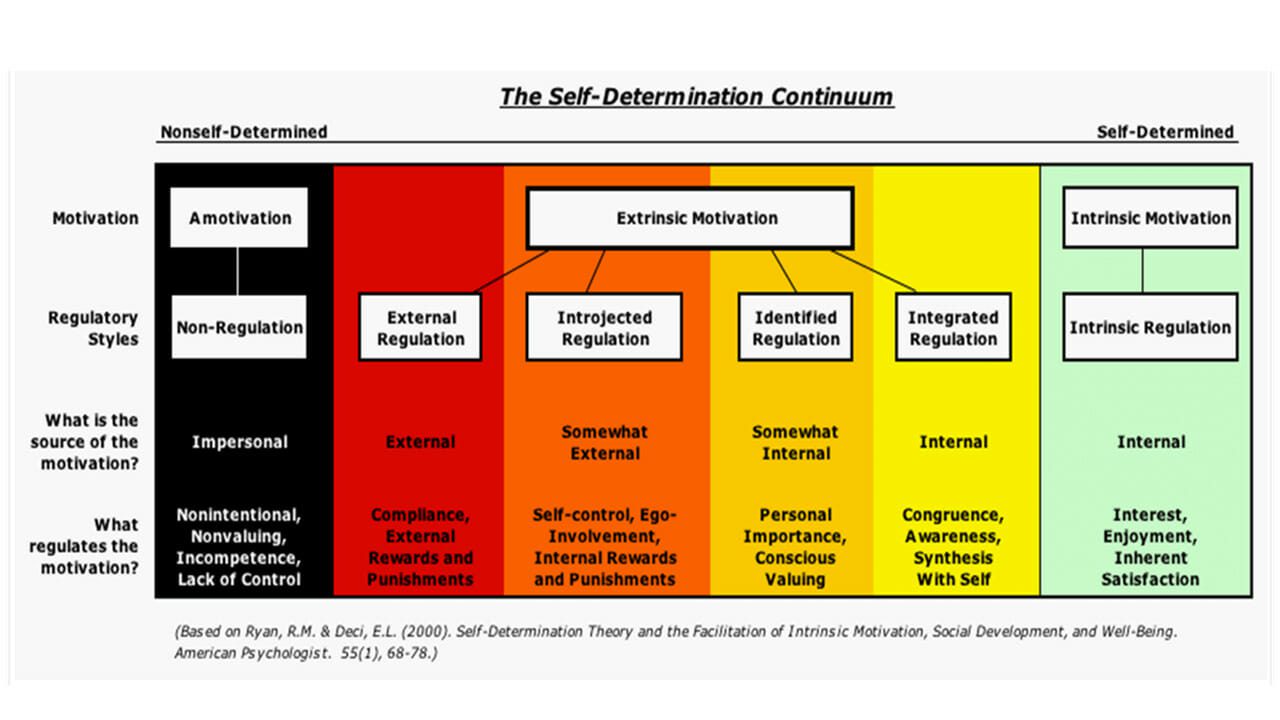Self determination theory and the importance of motivation in Positive Psychology Coaching
It almost goes without saying that Motivation is a crucial factor in any course of positive psychology coaching. Without a good, evidence-based understanding of motivation, it is always going to be a challenge to achieve the desired results in any coaching process. Positive psychology coaching is all about empowering individuals to live their best lives by achieving their goals, boosting their wellbeing, and enhancing a positive, growth oriented mindset. In this article, we will explore the importance of motivation in positive psychology coaching and how self-determination theory can help coaches understand and promote motivation in their clients.
Motivation is the driving force behind our thoughts, feelings, and behaviors. It is the energy that propels us towards our goals and gives us the momentum to take action. In positive psychology coaching, motivation is essential because it helps individuals overcome obstacles, stay focused, and achieve their desired outcomes. In the absence of motivation, it is easy to become discouraged, lose sight of our goals, and give up on our dreams.
Self-determination theory (SDT; Ryan and Deci, 2000) is an incredibly well researched theory of motivation that can help coaches and therapists to understand how to promote motivation in their clients. According to SDT, there are three basic psychological needs that are essential for motivation: autonomy, competence, and relatedness. Autonomy is the need for control and independence, competence is the need to feel capable and effective, and relatedness is the need for connection and social support.

When individuals feel that their basic psychological needs are being met, they are more likely to be motivated and engaged with both their goals and the positive psychology coaching process. Coaches can promote autonomy by providing choices and options for their clients, allowing them to take ownership of their goals and decisions. Competence can be enhanced by providing feedback, encouraging skill development, and setting achievable goals. Relatedness can be fostered by creating a supportive and empathetic coaching environment and promoting social connection.
One of the developers of SDT, Paul Ryan, details the basic psychological needs in this video:
The terms “intrinsic” and “extrinsic” motivation have entered the common language when talking about how to effect personal development. These terms have their origin in the foundations of SDT research, which conceptualises them as existing on a continuum from wholly amotivated, through 4 stages of extrinsic motivation to fully intrinsically motivated.

Intrinsic motivation refers to the desire to engage in an activity for its inherent enjoyment or satisfaction, rather than for external rewards or pressures. In positive psychology coaching, coaches can help individuals tap into their intrinsic motivation by helping them connect with their values, strengths, and passions. When individuals are motivated by intrinsic factors, they are more likely to experience positive emotions, be fully engaged in the coaching process, and sustain their motivation over time. Engaging fully in a task, one that is based on our freely chosen personal values, without any sense that we are doing it to meet external (or introjected) rewards or punishments, means that we are intrinsically motivated. When we are forced, pressured or even acting in the service of external reward (i.e., getting our wages), then we are extrinsically motivated and less likely to feel motivated to move in the direction of the anticipated outcome.
Here’s a personal example that I noticed from my own life. Typically, in my therapy and coaching work, I’m full of motivation as what I do is based on my own personal values and satisfies my basic psychological needs of autonomy, competence and relatedness. I work for myself (Autonomy), get to use and develop my therapy and positive psychology skills and experience (competence) and connect with my clients to help them get more out of their lives (relatedness). However, I noticed one day that I was getting a little despondent as I approached the office – distracted, restless and wanting to do anything but go to work. Reflecting on what what going on, I noticed that for the last week I had been working under pressure of getting money together to pay my end of year taxes. Although the work was the same, the fact that I was working for money to pay bills rather than working because I actually like it, compromised my sense of autonomy, which in turn led to a reduction in my over all levels of motivation. I had moved from being intrinsically motivated to extrinsic. Now, whenever I catch myself experiencing reduced motivation, whether in terms of work, personal life or self-development, I check in on these basic psychological needs – Am I accessing Autonomy, Competence and Relatedness. If not, then what do I need to do to nurture these elements again? The motivation then follows.
Here’s another video about motivation, in particular the seemingly counter-intuitive that more external reward (i.e., Money) doesn’t always lead to increased motivation!
Another important aspect of motivation in positive psychology coaching, and coaching in general, is goal setting. Goal setting is a powerful tool for promoting motivation because it helps us focus attention, prioritise action, and track progress. However, it’s important to consider how well our goals truly reflect our personal values, and our intrinsic desire to move in the direction of them. For example, I could have a well intended, SMART goal relating to losing weight but if this goal doesn’t satisfy the basic psychological needs of Autonomy, Relatedness and Competence, then my motivated to achieve it will be compromised. Good goal setting, in addition to the usual SMART parameters, absolutely needs to satisfy the basic psychological needs of the individual or motivation will be a struggle.
In conclusion, motivation is a critical component of positive psychology coaching. Self-determination theory can help coaches understand and promote motivation by focusing on the basic psychological needs of autonomy, competence, and relatedness. By promoting intrinsic motivation, goal setting, and positive emotions, coaches can empower individuals to achieve their goals, develop a positive mindset, and live their best lives.


